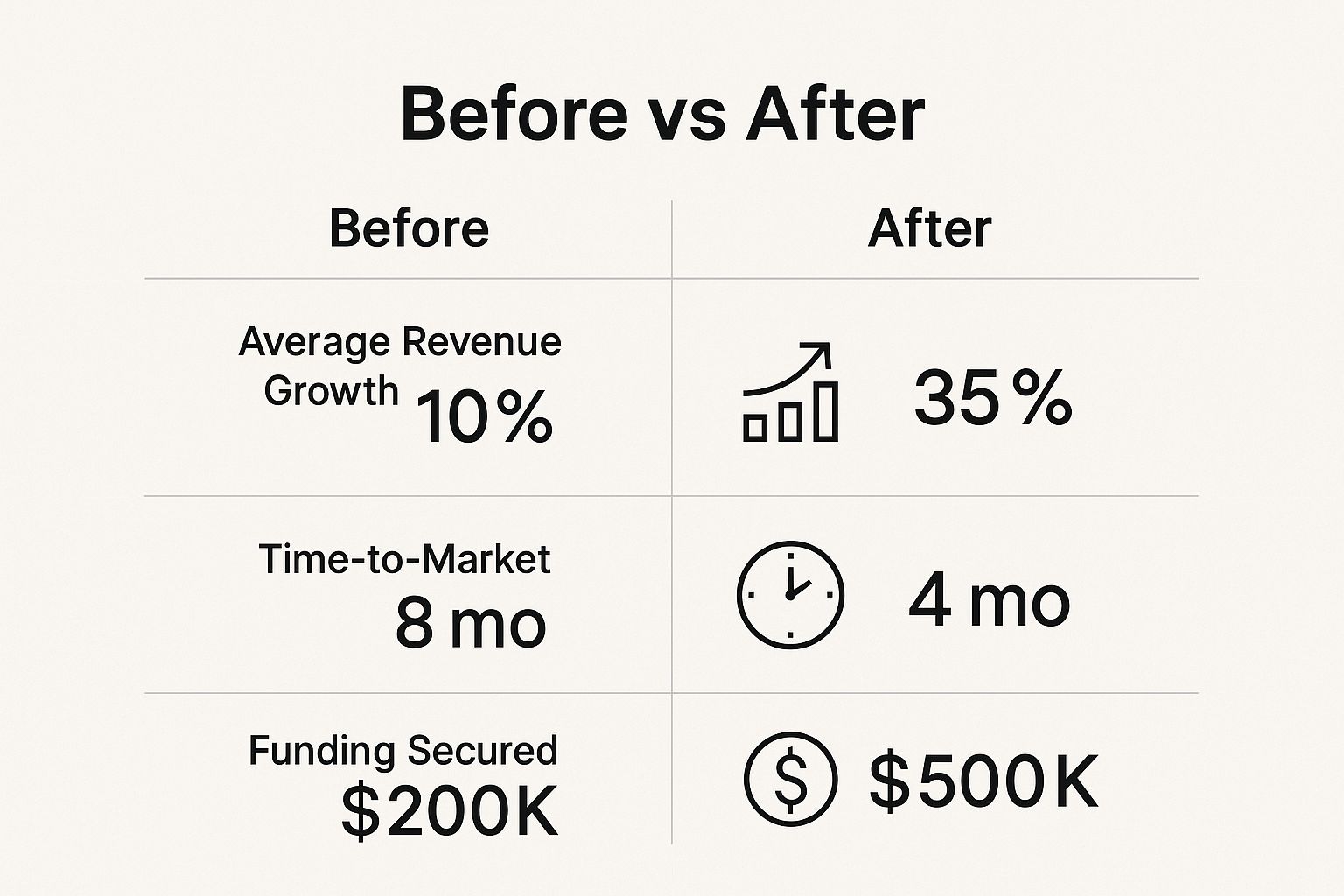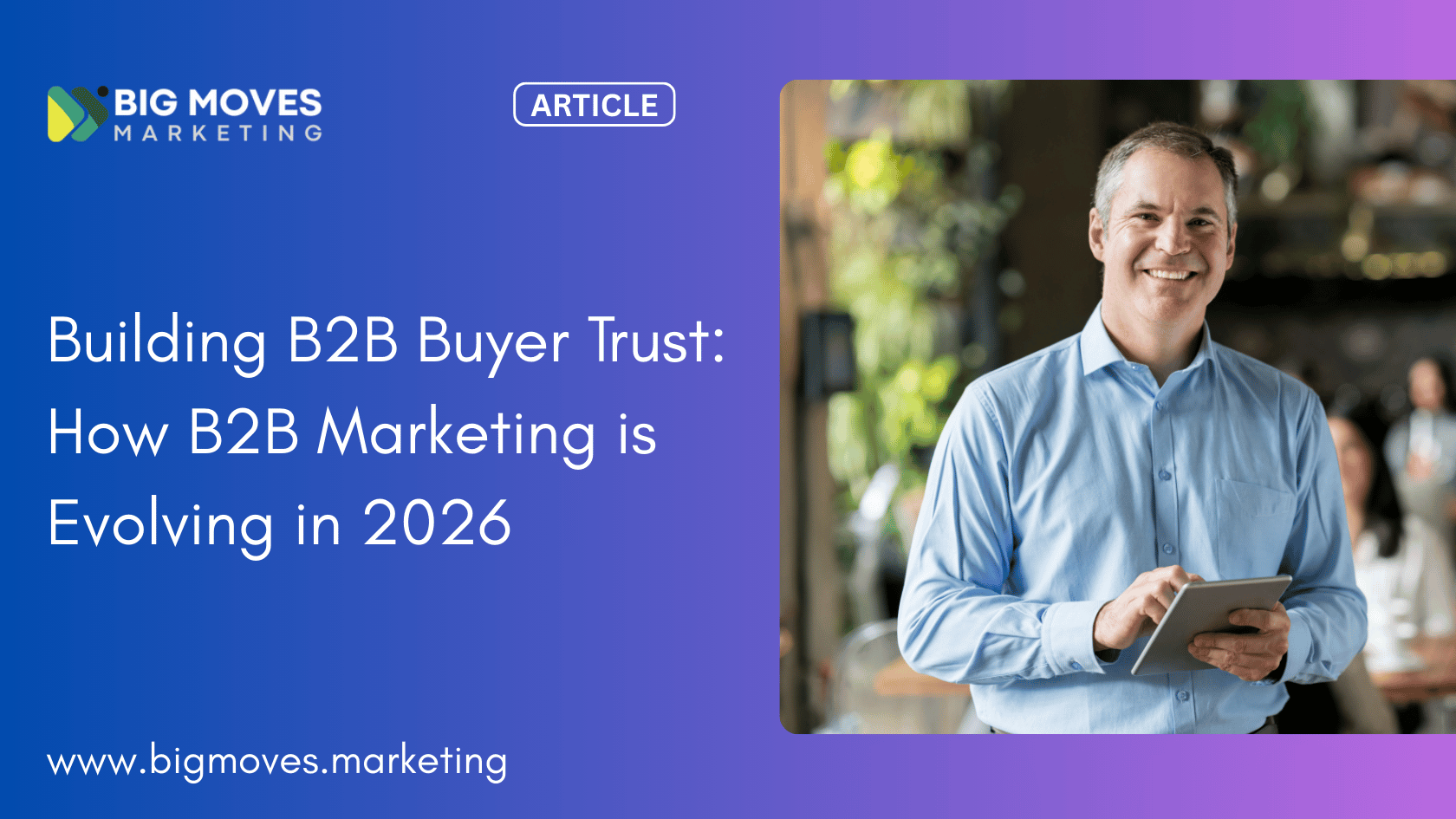Find Top Business Consultant for Startups Today

Think of a business consultant as more than just an advisor; they're your startup's secret weapon for turning a bright idea into a real, thriving company. These aren't just mentors—they're experienced co-pilots who have been in the trenches before. They help you navigate those gut-wrenching pivots, secure funding when the odds are stacked against you, and build scalable operations from the ground up.
Bringing on a consultant is a direct investment in strategic clarity, accelerated learning, and—most importantly—risk mitigation.

Why A Business Consultant Is Your Startup's Secret Weapon
Launching a company is an incredible ride, but it can also be a profoundly isolating one. Founders are somehow expected to be masters of everything at once—product, finance, marketing, sales. It’s an impossible standard. This is where a consultant acts as a force multiplier, stepping in to fill critical knowledge gaps and offering an objective, seasoned perspective you just can't get from inside your own echo chamber.
Imagine you're facing a make-or-break decision on your pricing model. Your team is split, and every day of waffling costs you potential revenue. A consultant can step in with market data and firsthand experience from dozens of other startups, guiding you to a confident, data-backed choice in a fraction of the time.
A good consultant brings a set of core benefits that can fundamentally change your startup's trajectory. Here’s a breakdown of what that looks like in practice.
Core Benefits of Hiring a Startup Consultant
Ultimately, these benefits work together to give you a significant competitive edge, allowing you to move faster and with more confidence than you could on your own.
Gain Objective Clarity and Strategic Focus
One of the biggest hurdles for any founder is seeing the forest for the trees. You're so deep in the daily grind that spotting bigger market shifts or internal inefficiencies becomes nearly impossible. A consultant brings that crucial outside-in view.
They can immediately identify operational bottlenecks you've grown accustomed to or point out a strategic pivot you’re just too close to the business to see. For instance, they might see an opportunity to implement small business marketing automation, freeing up your team's precious time to focus on high-impact growth activities instead of getting bogged down in manual tasks.
The real value of a great consultant isn't just in the answers they provide, but in the powerful questions they ask. They challenge your assumptions and force a level of strategic rigor that prevents costly mistakes down the road.
Accelerate Growth and Sidestep Common Pitfalls
The startup landscape is littered with the ghosts of great ideas that failed due to poor execution. A seasoned business consultant has seen the common pitfalls—the ones that sink company after company—and can help you steer clear of them. They come equipped with proven frameworks for everything from getting investor-ready to building a sales process that actually scales.
This expertise is highly valued for a reason. The global management consulting market is now worth over $1 trillion, and a staggering 60% of consultants land their first clients through powerful referral networks. That statistic alone speaks volumes about the trust and immense value companies place on their guidance. (Find out more about these consulting trends).
This partnership isn't just about avoiding failure; it's about hitting the accelerator on your success. By tapping into their experience, you can compress years of learning into a matter of months.
If you're running a B2B company, understanding this dynamic is especially critical. To go deeper, check out our guide on how a B2B marketing consultant can boost your business growth.
Matching the Consultant to Your Startup's Needs

Let's get one thing straight: hiring a business consultant isn't like ordering from a menu. There's no "one-size-fits-all" option that works for every startup.
Think of it this way—you wouldn't ask a heart surgeon to set a broken arm. The same logic applies here. The right consultant is a direct reflection of your most urgent challenge, and their expertise has to be a perfect match for where you are right now.
It all starts with an honest look in the mirror. Have you nailed your product but can't seem to crack the customer acquisition code? Or is your core business model still feeling a bit shaky? Your specific pain point is the only compass you need to guide your search.
Diagnosing Your Core Challenge
Before you can even think about finding the right expert, you need to get brutally honest about where the business is bleeding. Pinpointing the exact problem saves you time, money, and a world of frustration down the line.
Different consultants solve different problems. Let's break down the two main camps:
Strategic Consultants: These are your big-picture thinkers. You bring them in when your foundational strategy feels weak, you're staring down a major pivot, or you need to map out a long-term plan to outmaneuver the competition. They help you answer the critical "what" and "why" of your business.
Operational Consultants: If your day-to-day is a chaotic mess of inefficiency, this is who you call. They live to optimize supply chains, streamline internal workflows, and build robust systems that can actually handle growth. They’re obsessed with the "how."
This distinction is everything. A brilliant strategist might give you a world-class growth plan but have zero clue how to fix your broken fulfillment process. Knowing what you need is half the battle.
Finding Your Specialist
The global management consulting industry is massive—projected to be worth around $400 billion by 2025. But here's the good news for startups: it’s not all giant, faceless firms.
In fact, smaller, specialized boutique firms make up about 75% of the consulting world. This is a huge advantage. These agile specialists bring deep, niche expertise that a generalist from a mega-corp just can't match.
A startup's greatest advantage is its speed. The right consultant doesn't slow you down with corporate bureaucracy; they act as a force multiplier, accelerating your journey with focused, actionable guidance.
This brings us to the most important part: matching the consultant's function to your immediate hurdle.
For instance, if raising your next round is the mountain you need to climb, you don't just need a generic "business" consultant. You need a financial consultant who has a proven playbook for getting startups funded. They live and breathe pitch decks, financial models, and investor networks.
Or, if you've built an incredible product that no one knows exists, a marketing consultant is your answer. Their entire world revolves around customer acquisition, brand positioning, and building a growth engine that brings in predictable revenue. If you're in the B2B space, understanding the impact of expert B2B marketing consultants is non-negotiable—it can be the single factor that separates you from the competition.
Ultimately, the most critical step you'll take is matching your specific need—be it strategy, operations, finance, or marketing—with a consultant who has deep, relevant, and proven experience in that exact area. Get this right, and you've set the stage for a truly valuable partnership.
How to Vet and Select Your Ideal Consultant
Picking a consultant is a lot like hiring a co-pilot for your startup. It’s a decision built on trust and proven competence. It goes way beyond a quick LinkedIn search. You need a real-world framework to vet potential advisors, ensuring you land someone who will genuinely multiply your efforts, not just drain your resources.
The goal isn't just to find someone with a flashy resume from a big corporation. While that’s interesting, it’s often irrelevant. You’re looking for a partner who has navigated the exact kind of trenches you're about to enter. Their track record with startups like yours is what truly matters.
Look for Proven Startup Experience
When you’re talking to a potential business consultant, you need to know they speak your language—the language of tight budgets, fast pivots, and making decisions with incomplete data. A great way to start is by asking for case studies or examples of their work with companies at a similar stage to yours, facing similar challenges.
But don’t let them get away with vague success stories. You have to dig deeper with pointed questions that cut through the fluff:
- "Walk me through a time you helped a startup pivot its strategy. What was the situation, what did you advise, and what was the actual outcome?"
- "Tell me about guiding a founder through a tough fundraising round. What was your specific role?"
- "What’s an example of an operational bottleneck you helped a previous client fix? Get specific."
- "Describe your problem-solving process when data is limited, which is pretty much standard for an early-stage company."
Questions like these shift the conversation from abstract claims to concrete, relevant experience. You're listening for answers that show a deep, empathetic understanding of the resource constraints and breakneck speed of a startup.
Digging Deep with References
Reference checks are your best tool for getting to the truth behind the sales pitch. But a generic, "So, did you like working with them?" won't get you anywhere. To get real insight, you need to ask targeted questions that reveal their working style and actual impact.
When you get a past client on the phone, try asking things like this:
- Working Style: "How did they actually integrate with your team? Were they more of a collaborative partner who rolled up their sleeves, or did they just hand down directives?"
- Problem-Solving in Action: "Can you give me an example of a really tough problem they helped you solve? I'm curious about how they approached it."
- Tangible Results: "What was the single most valuable outcome from their time with you? And did it line up with the goals you set at the beginning?"
This approach gives you a 360-degree view. You’ll learn not just what they accomplished, but how they did it—which is absolutely critical for figuring out if they'll be a good cultural fit for your team.
A consultant's true value isn't just in the strategies they propose, but in the clarity and confidence they instill in your team. Look for a partner who challenges your assumptions while championing your vision.
Ultimately, this whole vetting process is about spotting the difference between a genuine expert and someone just selling generic promises. A top-tier consultant will come prepared with data-backed success stories, communicate with radical transparency, and show a real passion for helping startups win.
For B2B companies, understanding how an advisor can specifically accelerate your go-to-market and sales engine is crucial. You can learn more about how a B2B consultant accelerates business growth to see exactly how this kind of partnership can change your company's trajectory.
Structuring the Engagement for Maximum Impact
You've found a consultant who seems like a perfect fit. That’s great, but the work is only half done. How you actually structure the relationship is just as critical as who you hire.
I've seen too many founders get this part wrong. A vague scope or poorly defined agreement is a fast track to wasted cash, misaligned expectations, and a whole lot of frustration. To get real value from this partnership, you have to build a clear and effective engagement plan from day one.
The right structure isn't one-size-fits-all; it depends entirely on your specific needs, your budget, and what you’re trying to accomplish right now.
The right partnership can be a massive accelerant for growth, speeding up market entry and even making your fundraising efforts more successful.

As you can see, a well-structured engagement isn't just about getting advice—it's about driving tangible results across the metrics that matter most to a startup.
Choosing Your Engagement Model
Let's break down the common ways to structure a consulting relationship. This choice sets the entire tone for how you'll work together, so it's important to get it right.
To make this easier, here’s a quick-reference table that lays out the most common models. Think about your immediate goals and cash flow as you review these options.
Comparing Startup Consulting Engagement Models
A great consultant will actually help you choose the right model for your situation. Be wary of anyone who pushes for a long-term, expensive retainer when all you really need is a single, well-defined project. That’s a major red flag.
Defining a Powerful Scope of Work
Once you've settled on an engagement model, the next step is to collaboratively build a Scope of Work (SOW). This document is your North Star. It’s what turns your abstract goals into a concrete action plan and eliminates any ambiguity about what "done" looks like.
A well-crafted Scope of Work is the ultimate communication tool. It ensures both you and your consultant are aiming for the exact same target.
Your SOW needs to be more than just a formality; it’s your roadmap to success. Make sure it clearly spells out these key components:
- SMART Goals: Don't settle for vague objectives. Instead of "increase leads," your goal should be "Increase marketing qualified leads by 20% in Q3." Define goals that are Specific, Measurable, Achievable, Relevant, and Time-bound.
- Key Deliverables: What, exactly, will the consultant produce? Be specific. This could be a market research report, a new sales playbook, or a finalized investor pitch deck ready for your roadshow.
- Communication Cadence: How often will you connect? Is it a weekly 30-minute check-in call or a bi-weekly deep-dive session? Set the expectation right from the start to avoid any confusion.
- Success Metrics: How will you measure the impact and ROI? Define the key performance indicators (KPIs) you'll track to gauge whether the engagement was a success.
This level of clarity is absolutely essential. For founders trying to build a powerful growth engine, getting these details right is a complete game-changer. If you want to dive deeper into this, our guide on marketing strategy consulting for business growth offers more detailed frameworks you can use.
Measuring the True ROI of Your Partnership

When you bring on a consultant, you're not just spending capital; you're investing trust. So how do you know if that investment is actually paying off? Moving beyond a simple gut feeling requires a disciplined look at the results, balancing the hard numbers with the equally critical—but harder to pin down—strategic gains.
The goal isn't just to see more activity. It's about generating real momentum. By getting clear on what success looks like before the work even starts, you create a transparent way to measure progress and ensure every dollar you spend is pushing your startup forward.
Go Beyond the Obvious Metrics
Every founder loves watching revenue charts trend up and to the right. But the impact of a great consultant often shows up in less obvious, yet incredibly powerful ways. To capture the full picture, you need to track a mix of quantitative and qualitative key performance indicators (KPIs).
Here’s a look at the crucial metrics you should be monitoring:
Quantitative KPIs (The Hard Numbers):
- Reduced Customer Acquisition Cost (CAC): A clear sign your marketing and sales engine is getting more efficient.
- Improved Sales Conversion Rates: Shows that your messaging, positioning, and sales processes are hitting the mark.
- Increased Lead Velocity Rate: This measures the month-over-month growth in qualified leads, telling you if your top-of-funnel is truly healthy.
- Funding Secured: For many startups, this is the ultimate validation, reflecting a compelling story and a solid plan.
Qualitative KPIs (The Strategic Gains):
- Improved Strategic Clarity: Your leadership team has a unified vision and can confidently articulate the company’s direction. No more circular conversations.
- Increased Team Efficiency: Processes are smoother, bottlenecks get busted, and your team spends less time on rework.
- Faster, More Confident Decisions: You stop debating the same issues and start making data-backed choices with conviction.
Aligning Metrics with Business Goals
The real art is connecting these KPIs directly to the specific challenges you hired the consultant to solve.
If you brought in an expert to fix your go-to-market strategy, then your primary metrics should be a significant jump in lead quality and conversion rates. Understanding how B2B marketing and sales consultants drive startup growth is key to setting the right expectations from day one.
This alignment ensures you’re measuring what truly matters for your startup’s current stage. It's why the consulting industry remains so resilient—this kind of specialized advice is critical for navigating volatile markets. For instance, despite a minor economic dip in early 2025, demand for private business consulting held firm, and job openings in the sector grew by over 10% in a single month. This signals a sustained need for experts who can help startups scale. You can dig into more insights from the May 2025 consulting industry market review.
The most valuable ROI often comes from the mistakes you didn't make. A great consultant helps you sidestep costly errors, saving you time and capital that you can reinvest into growth.
By tracking both the numbers on your dashboard and the newfound confidence in your boardroom, you get a complete and honest assessment. This balanced view proves the value of your partnership and empowers you to make smarter investments in your startup's future.
Frequently Asked Questions
Even when you see the value, bringing a business consultant into your startup can feel like a big step. It’s natural to have a few last-minute questions. I've put together answers to the most common things founders ask me, so you can move forward feeling completely sure of your decision.
Think of this as the final check-in before you bring an expert co-pilot on board to help you navigate your startup's growth.
When Is the Right Time to Hire a Consultant?
Honestly, the best time is usually just before you think you need one. You want to get ahead of the big moments, not react to them. Are you gearing up for a funding round? Planning to scale your team or operations? Getting ready to crack a new market? A great consultant helps you prepare for these inflection points proactively, so you're not just putting out fires.
But here’s a simpler gut check: if you feel stuck, if you keep running into the same wall your team can't seem to break through, or if you're just desperate for an objective, outside perspective on your strategy, it's probably time to start the conversation.
Should I Offer Equity Instead of Cash?
For early-stage startups where cash is tight, offering equity can be a really smart move. It can turn a simple transaction into a genuine partnership, aligning your consultant's goals with your company's long-term success. Suddenly, they're not just a contractor; they're invested in the outcome right alongside you.
A word of caution: don't hand out equity like candy. This model is best for long-term, strategic advisory roles, not for short, defined projects. Always protect your company with a formal vesting schedule and make sure the amount of equity is proportional to the value they're bringing to the table.
Equity isn't a substitute for cash in every situation, but for the right long-term advisor, it can be a total game-changer.
What Is a Reasonable Cost for a Startup Consultant?
This is the million-dollar question, and the honest answer is: it varies. A lot. The cost depends entirely on the consultant's experience, their specialty, and the scope of the work.
Just to give you a ballpark:
- Hourly Rates: You might see rates from $150/hour for consultants who are still building their reputation, all the way up to $500/hour or more for seasoned experts with a long track record of success.
- Project-Based Fees: A small, well-defined project could run a few thousand dollars. A comprehensive strategic plan could easily be tens of thousands.
But here's a crucial mindset shift: instead of fixating on the cost, focus on the potential return on investment (ROI). A consultant who costs $20,000 but helps you secure a $1 million seed round or double your conversion rate isn't an expense—they're one of the best investments you'll ever make.
How Do I Maximize the Value from My Consultant?
Getting the most bang for your buck comes down to one thing: treat them like a core member of your team, not an outsider. Your preparation and collaboration are what make the partnership work.
To make sure you get a massive impact, follow these steps:
- Come Prepared: Every meeting should have a clear agenda and specific questions. Don't waste their expensive time (and your money) on updates they could have read in an email.
- Be Radically Transparent: Your consultant can only fix the problems they know exist. Give them the real data, share the ugly numbers, and be honest about where you're struggling.
- Designate a Point Person: To avoid confusion and mixed messages, have one person on your team be the main point of contact. This keeps communication streamlined and efficient.
- Empower Them to Succeed: Listen to their advice. Act on the strategies you build together. Give them the access and tools they need to help you win.
Ready to stop guessing and start growing with a proven strategic partner? Big Moves Marketing offers fractional CMO expertise specifically for B2B SaaS startups, translating over 15 years of experience into a clear roadmap for your success. Let's build your growth engine together.
Find out how we can help you at https://bigmoves.marketing.
%20png%20copy.png)






%20-%20white.svg)
